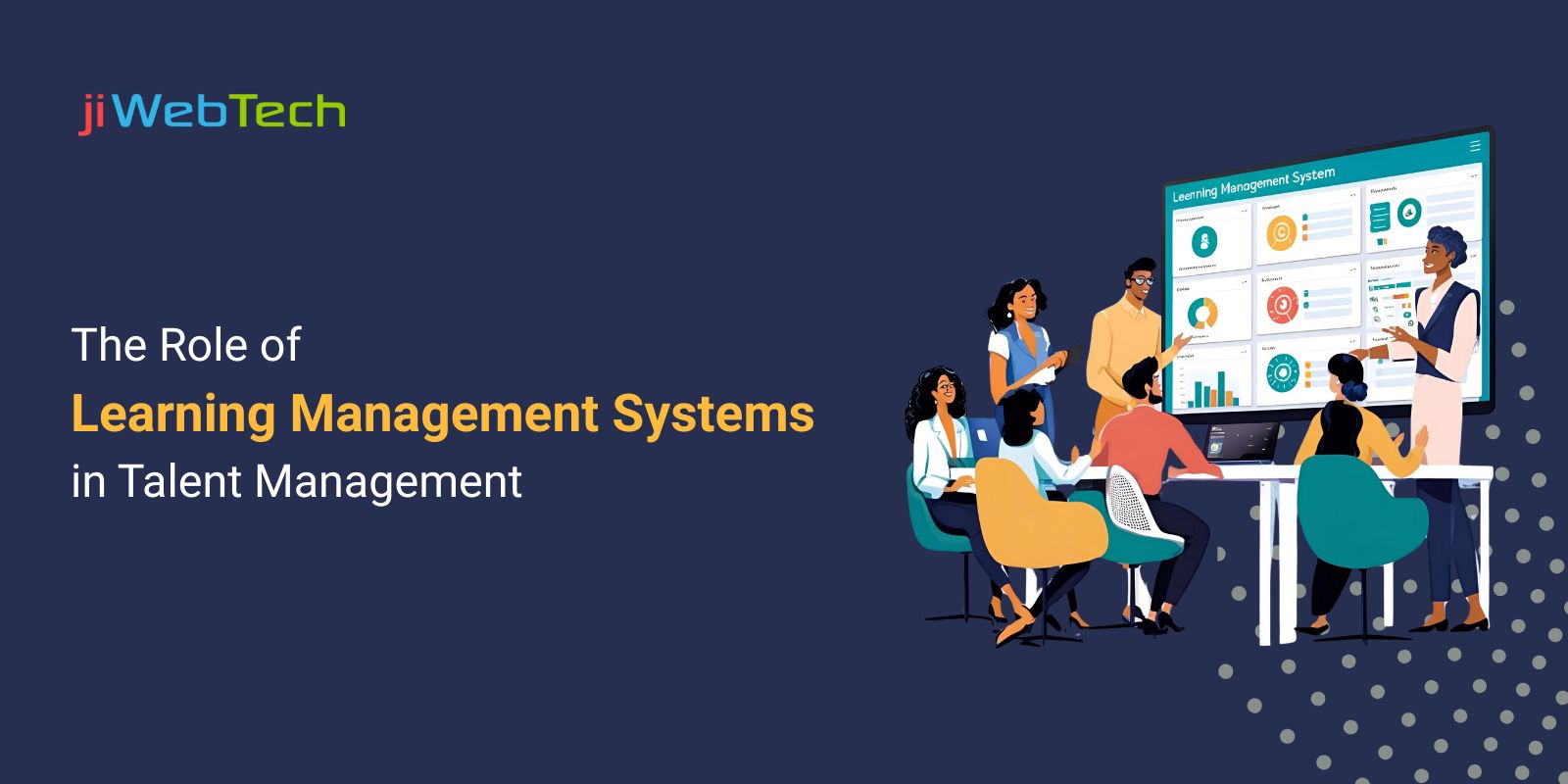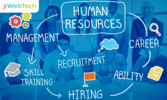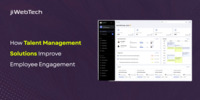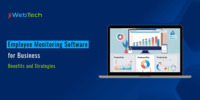- May 02, 2025
- Talent Management
- 2388
Share this post on:

In today’s busy business world, companies know that their most important asset is not just what they sell or make,but their people. Managing talent—meaning attracting, training, keeping, and making the most of employees—is very important for a company to succeed. As the way people work changes and the need for skilled workers grows, Learning Management Systems (LMS) have become very helpful tools for managing talent.
This blog will explain how LMS plays a key role in talent management. It will show how LMS helps keep employees interested, improve their skills, stay with the company, and help the organization grow.
Understanding Talent Management
Talent management includes many HR activities like hiring, helping new employees settle in, training, checking performance, planning for future leaders, and developing employees. The main goal is to make sure the right people are in the right jobs, with the skills and motivation to help the organization succeed. Good talent management is not just a one-time task, it is an ongoing process that keeps the workforce skills aligned with the company's goals.
The Evolution of Learning Management Systems
Originally, LMS platforms were made to provide and track training programs. Over time, they have become more advanced and now support many different learning and development activities. Today’s LMS platforms include features like personalized learning plans, skill management, real-time data, social learning, and connections with other HR systems. Because of these changes, LMS has become a key part of managing talent in organizations.
How LMS Empowers Talent Management
1. Streamlined Onboarding and Orientation: A smooth onboarding experience sets the stage for employee success and retention. LMS platforms enable organizations to deliver consistent, engaging, and scalable onboarding programs. New hires can access essential training modules, company policies, and role-specific information at their own pace, ensuring they are well-prepared to contribute from day one.
LMS also allows for the assessment of new employees’ skills and readiness, enabling HR teams to tailor additional training as needed. This personalized approach accelerates integration, boosts confidence, and reduces time-to-productivity.
2. Continuous Learning and Skill Development: The modern workplace demands continuous learning. As technologies and business practices evolve, employees must regularly update their skills to remain effective. LMS platforms facilitate ongoing development by offering a vast library of courses, certifications, and learning resources accessible anytime, anywhere.
Personalized learning paths, based on individual roles and career aspirations, help employees acquire new competencies aligned with organizational needs.Thisnot only enhances job performance but also prepares employees for future roles, supporting succession planning and internal mobility.
3. Performance Management and Feedback: Integrating performance management with LMS enables organizations to link learning activities directly to performance outcomes. Managers can set goals, track progress, and provide regular feedback through the LMS, fostering a culture of accountability and growth.
By consolidating learning and performance data, organizations gain deeper insights into employee strengths, areas for improvement, and training effectiveness. This data-driven approach ensures that development initiatives are targeted and impactful, driving better business results.
4. Succession Planning: One of the leading causes of employee turnover is the perceived lack of career advancement opportunities. LMS platforms address this by providing clear, structured career paths and visibility into available roles within the organization.
Employees can explore required competencies for desired positions, access relevant training, and track their progress toward career goals. This transparency empowers employees to take charge of their development, increasing engagement and loyalty while enabling organizations to build a robust internal talent pipeline.
5. Data-Driven Talent Decisions: LMS platforms generate a wealth of data on employee learning behaviors, skill acquisition, and performance outcomes. By leveraging advanced analytics and reporting tools, organizations can make informed decisions about talent management strategies.
For example, analyzing learning data can reveal skill gaps, high-potential employees, and trends in engagement or attrition. This enables HR leaders to proactively address workforce challenges, optimize training investments, and align talent development with business objectives.
6. Enhancing Employee Engagement and Retention: Engaged employees are more productive, innovative, and committed to their organizations. LMS platforms contribute to engagement by fostering a culture of learning, recognition, and growth. Features such as gamification, social learning, and peer collaboration make training interactive and enjoyable, increasing participation and knowledge retention.
Moreover, when employees see that their organization invests in their development and provides clear paths for advancement, they are more likely to stay, reducing turnover and associated costs.
7. Compliance and Risk Management: In highly regulated industries, compliance training is essential to minimize legal and operational risks. LMS platforms automate the delivery, tracking, and reporting of mandatory training, ensuring that employees meet all regulatory requirements. Automated reminders and certifications help organizations maintain compliance and avoid costly penalties.
The Strategic Impact of LMS on Talent Management
Aligning Learning with Business Goals: For talent management to deliver real value,learning initiatives must be closely aligned with organizational objectives.LMS platforms enable HR and business leaders to map learning programs to strategic priorities, ensuring that employees develop the skills needed to drive growth and innovation.
By integrating LMS with other HR systems, organizations can create a seamless talent management ecosystem where learning, performance, and career development are interconnected. This holistic approach maximizes the impact of talent initiatives and supports long-term business success.
Supporting a Diverse and Agile Workforce: Today’s workforce is increasingly diverse, with employees spanning multiple generations, backgrounds, and locations. LMS platforms support inclusivity by offering flexible, accessible learning options that cater to different learning styles and needs.
Additionally, as organizations embrace remote and hybrid work models, LMS ensures that all employees—regardless of location—have equal access to development opportunities. This agility is crucial for attracting and retaining top talent in a rapidly changing labor market.
Fostering a Culture of Continuous Improvement: A culture of continuous improvement is essential for organizational resilience and competitiveness. LMS platforms encourage lifelong learning by making development resources readily available and promoting self-directed growth. When learning becomes an integral part of the employee experience, organizations are better equipped to adapt to change, innovate, and achieve sustainable success.
Best Practices for Leveraging LMS in Talent Management
To maximize the benefits of LMS in talent management, organizations should consider the following best practices:
- Align LMS Content with Business Strategy: Ensure that learning programs address current and future skill requirements, supporting organizational goals.
- Personalized Learning Experiences: Use data and analytics to create individualized learning paths that cater to different roles, career stages, and aspirations.
- Integrate with HR Systems: Connect LMS with performance management, recruitment, and succession planning tools for a unified talent management approach.
- Promote Social and Collaborative Learning: Encourage knowledge sharing, peer feedback, and team-based learning to enhance engagement and innovation.
- Measure and Optimize Impact: Regularly assess the effectiveness of learning initiatives using LMS analytics, and adjust strategies based on data-driven insights.
The Future of LMS in Talent Management
As technology advances, the role of LMS in talent management will continue to expand. Artificial intelligence, machine learning, and advanced analytics will enable even more personalized, adaptive learning experiences. Integration with talent marketplaces, skills assessments, and career planning tools will further enhance the ability of organizations to attract, develop, and retain top talent.
Conclusion
The integration of Learning Management Systems into talent management strategies is no longer optional, it is essential for organizations seeking to thrive in a dynamic, talent-driven landscape. By streamlining onboarding, enabling continuous learning, supporting performance management, and providing actionable insights, LMS platforms empower organizations to unlock the full potential of their workforce.
At jiWebTech, we believe that investing in the right LMS is an investment in your people—and ultimately, your organization’s success. By embracing a culture of learning and leveraging the power of technology, businesses can build agile, engaged, and future-ready teams that drive sustainable growth.
FAQs
1. Can an LMS be integrated with other talent management systems?
Yes. Most modern LMS platforms can integrate with:
- Human Resource Information Systems (HRIS)
- Talent Acquisition platforms
- Performance Management Systems
- Succession Planning tools
This enables a unified view of employee growth and potential.
2. What role does data analytics play in LMS-driven talent management?
Data analytics in LMS platforms provides insights into:
- Learner engagement and progress
- Course effectiveness
- ROI on training investments
- Trends in employee skill development
These insights inform strategic workforce planning and performance improvement.
3. How can organizations measure the ROI of LMS in talent management?
Organizations can assess LMS ROI by evaluating:
- Reduced turnover rates
- Increased employee productivity
- Faster time-to-competency
- Improved performance metrics
- Cost savings from centralized learning
4. Are LMS platforms scalable for large organizations?
Yes. LMS platforms are highly scalable and can accommodate thousands of users across multiple departments or locations. They support multilingual content, role-based access, and modular learning structures.
5. What challenges might organizations face when implementing an LMS for talent management?
Common challenges include:
- Resistance to change from employeesInadequate integration with existing HR systems
- Low initial engagement
- Poorly designed learning content
- Lack of clear learning objectives
These can be mitigated with strong leadership support, training, and user-friendly LMS design.









